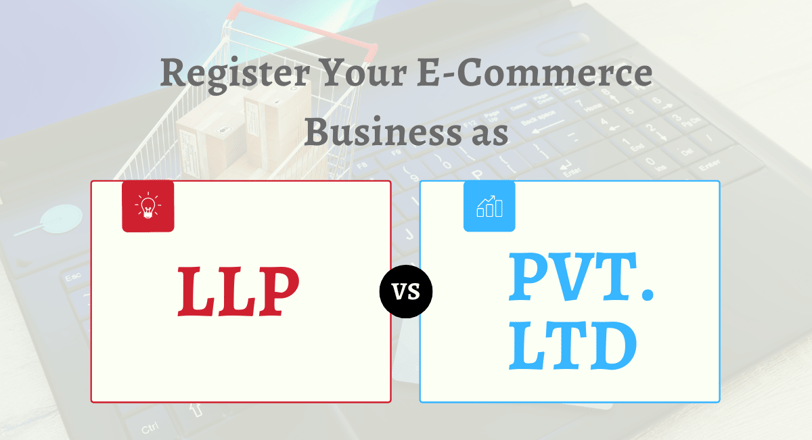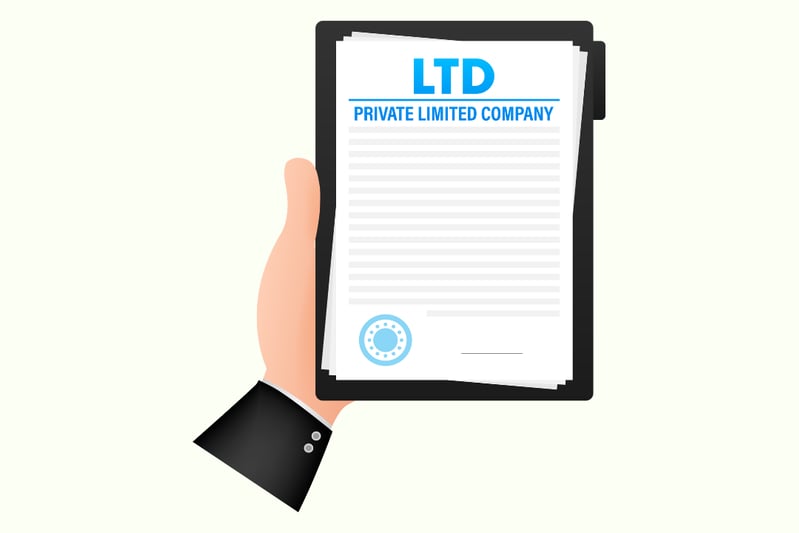Should You Register Your E-Commerce Business in India as LLP or Private Limited?
Learn whether to register your e-commerce business in India as an LLP or Private Limited Company. Explore liability protection, compliance costs, and growth potential to make the best choice.
STARTUPSCA SERVICES
10/4/20247 min read


Introduction
Many Indians want to start their own e-commerce business they learned about how to create a website and how to sell their products online they also can manage their social media so well but when it comes to the legalization of business, somehow lack the information about company matters and laws people has lots of doubts about company legalization. If you also starting your online venture then choosing the right legal structure is one of the first crucial decisions you'll make when starting your e-commerce business in India. Whether selling through your platform or using marketplaces, the structure you choose affects your business operations, compliance requirements, and long-term growth potential.
In India, Limited Liability Partnership (LLP) and Private Limited (Pvt. Ltd.) Companies are two common legal structures for small and growing businesses. Both offer limited liability protection, which means your personal assets are safeguarded in case of business debts or liabilities. But how do you choose between the two?
This article explores the key differences between an LLP and a Pvt. Ltd. company, helping you decide the best option for your e-commerce venture.
Key Takeaways:
LLP and Private Limited are two popular legal structures for small businesses in India.
Both structures offer limited liability protection, but the choice depends on your business's growth ambitions and fundraising needs.
LLP has fewer compliance requirements, making it ideal for small e-commerce startups.
Private Limited companies offer greater scope for investment and expansion, making it suitable for businesses aiming to scale.
Consider factors like taxation, ownership structure, and regulatory compliance before making your decision.
What is an LLP?
An LLP (Limited Liability Partnership) combines the flexibility of a partnership with the advantages of limited liability protection. It is a popular choice among small business owners who want to keep compliance costs low while enjoying a clear distinction between personal and business liabilities.
Key Features of an LLP:
Limited Liability: Like a Pvt. Ltd. company, the liability of each partner is limited to the amount they contribute to the business. This means partners aren’t personally responsible for debts beyond their investment.
Partnership Structure: Unlike Pvt. Ltd. companies, LLPs operate like partnerships where management responsibilities can be flexible, making it ideal for businesses with small teams.
Low Compliance Costs: LLPs are subject to fewer compliance requirements compared to Pvt. Ltd. companies, with no mandatory audits unless annual turnover exceeds ₹40 lakhs or capital contributions exceed ₹25 lakhs.
Who Should Choose an LLP?
LLPs are ideal for e-commerce startups and small businesses that want to focus on growth without the heavy compliance burden. If you're starting with a few partners and minimal external funding needs, LLP is a great choice.
What is a Private Limited Company?
A Private Limited Company (Pvt. Ltd.) is a separate legal entity where ownership is divided among shareholders. It is one of the most popular legal structures for businesses that seek external investment or plan to scale rapidly.
Key Features of a Pvt. Ltd. Company:
Separate Legal Entity: The company is a separate legal entity from its shareholders. This offers strong protection for personal assets and allows for smooth ownership transfers.
Limited Liability: Just like LLPs, Pvt. Ltd. companies limit the liability of shareholders to their investment in the company.
Investment Potential: Pvt. Ltd. companies can raise funds by issuing shares, making it easier to attract investors. This is crucial for e-commerce businesses looking to scale quickly or enter new markets.
Higher Compliance Requirements: Pvt. Ltd. companies must adhere to stricter regulations, including regular audits, board meetings, and annual filings. The cost of compliance is higher than for LLPs.
Who Should Choose a Pvt. Ltd. Company?
A Pvt. Ltd. company is suited for businesses with high growth potential, especially those seeking external funding from investors or venture capitalists. If you foresee rapid expansion or plan to raise funds, a Pvt. Ltd. company offers the flexibility and structure you need.
Comparison Between LLP and Pvt. Ltd.
Liability Protection
Both LLPs and Pvt. Ltd. companies offer limited liability protection, which shields the personal assets of owners or partners. In both structures, the business itself is responsible for any liabilities, not the individuals running it.
However, in an LLP, partners may have more flexibility in managing the business, while in a Pvt. Ltd. company, shareholders are typically separate from the management team, unless they hold dual roles as directors. This separation of ownership and management is key for businesses planning to expand with professional management teams.
Comparison Between LLP and Pvt. Ltd.
Investment and Growth Potential
One of the biggest differences between LLPs and Pvt. Ltd. companies is their ability to raise funds.
LLP: LLPs are typically not attractive to outside investors. Since LLPs cannot issue shares, they face limitations when it comes to raising equity capital. For an e-commerce business that doesn’t require significant outside funding or aims to remain small, an LLP is a viable option. However, if the business plans to attract external investors or venture capitalists, an LLP may struggle to meet these needs.
Private Limited Company: A Pvt. Ltd. company is the preferred choice for businesses seeking external funding. It allows shareholders to invest in the company in exchange for shares, making it easier to attract angel investors, venture capitalists, and even private equity firms. For e-commerce businesses with plans for rapid expansion, a Pvt. Ltd. company provides a structure that aligns well with raising capital and scaling.
Compliance and Costs
Another crucial factor in deciding between LLP and Pvt. Ltd. is the compliance burden. Both structures have distinct compliance requirements, but the costs and time involved vary significantly.
LLP Compliance: LLPs enjoy lighter compliance obligations compared to Pvt. Ltd. companies. The need for mandatory audits arises only if the turnover exceeds ₹40 lakhs or the contribution exceeds ₹25 lakhs. Furthermore, annual filings are limited to the submission of Form 8 (Statement of Accounts and Solvency) and Form 11 (Annual Return).
Pvt. Ltd. Compliance: A Pvt. Ltd. company has stricter compliance requirements. It is mandatory to file annual returns with the Registrar of Companies (ROC), undergo an audit every financial year, and hold board meetings at least four times a year. Compliance costs for a Pvt. Ltd. company, including audit fees, legal filings, and taxes, can be significantly higher.
For small e-commerce businesses, LLPs provide the advantage of lower administrative costs. Pvt. Ltd. companies, while costlier to maintain, are necessary for businesses that plan to seek investment or establish a robust corporate structure.
Taxation
Taxation is another key area where LLPs and Pvt. Ltd. companies differ, impacting overall profitability.
LLP Taxation: LLPs are taxed similarly to partnerships. The income of the LLP is taxed at a flat rate of 30%, plus a surcharge and cess as applicable. However, LLPs are not subject to dividend distribution tax (DDT), making them more tax-efficient in certain cases. The partners can withdraw profits without facing additional tax on dividends, unlike Pvt. Ltd. companies.
Private Limited Taxation: A Pvt. Ltd. company is subject to corporate tax on its profits, typically at a rate of 22% (after deductions and concessions). However, any dividend paid to shareholders is taxed as per the individual shareholder’s tax slab. Additionally, Pvt. Ltd. companies must comply with the dividend distribution tax, which can result in double taxation (once on the company’s profits and again on distributed dividends).
For e-commerce businesses looking to maximize tax savings, LLPs may offer a better structure due to lower taxation on profit withdrawals.
Ownership and Management Structure
Ownership and management in LLPs and Pvt. Ltd. companies differ, particularly in how decisions are made and how ownership is transferred.
LLP: In an LLP, the partners can have a flexible role in managing the business. There are no restrictions on the number of partners, and they can decide the business’s direction without needing to follow rigid company laws. However, transferring ownership in an LLP can be more complex because it usually requires the consent of all partners.
Private Limited Company: In a Pvt. Ltd. company, the ownership is divided among shareholders. The shareholders may not be involved in the day-to-day management unless they are also directors. A Pvt. Ltd. company allows easy transfer of shares, making it simpler for investors to exit the business or for new shareholders to join. This flexibility in ownership makes Pvt. Ltd. a preferred structure for businesses planning to scale or attract new partners.
Factors to Consider for E-commerce Businesses
When deciding between LLP and Pvt. Ltd., there are several critical factors to consider based on the nature and long-term goals of your e-commerce business:
Investment Plans: If you plan to seek investors or expand rapidly, a Pvt. Ltd. company is the better choice due to its ability to raise equity capital.
Growth Potential: For e-commerce businesses with the vision of scaling nationally or internationally, a Pvt. Ltd. structure offers the flexibility needed for expansion.
Compliance Comfort: If you prefer a low-maintenance structure with minimal compliance, an LLP offers fewer regulatory obligations.
Tax Considerations: If you plan to reinvest profits or distribute earnings to partners, an LLP can be more tax-efficient due to its simpler tax structure.
Liability and Ownership: Both structures provide limited liability protection, but if you expect frequent changes in ownership or management, a Pvt. Ltd. company may provide more flexibility in transferring shares.
Conclusion: Which is Right for Your E-Commerce Business?
Choosing between an LLP and Pvt. Ltd. company depends largely on your business’s growth ambitions, funding needs, and comfort with compliance. If your e-commerce business is in its early stages and you prefer a low-compliance structure, an LLP is likely the best fit. It offers flexibility in management and ownership with lower compliance costs.
However, if you have plans to scale quickly, attract investors, or position your business for future growth, a Private Limited Company offers a more structured framework that facilitates fundraising and expansion.
In either case, it’s advisable to consult a legal expert or business advisor to ensure you make the best decision based on your unique business needs.
Arthiq provides this type of legal expertise and business advisories for people like you our aim is to help 10 lakh people every 5 years so that Arthiq can contribute to the Growth of India's GDP . If you already started your e-commerce platform then we want you to focus on just growing your business rest you can leave it to us we will handle the boring registration task on your behalf contact us now




Address
Bhilai Ofice :- Hall No. 02, 2nd floor, Chauhan state, GE Road Supela, Bhilai, CG 490023
Pune Office:- 2nd Floor, Jera Junction. Above Latur Urban Cooperative Bank, Lullanagar Kondhawa, Kondhwa Rd, Lulla nagar, Pune, Maharashtra 411040
Contacts
+91 8269269265
info@arthiq.co.in
admin@arthiq.co.in
Subscribe to our newsletter
Quick Links
Our Partners & Associates














© 2024 ARTHiQ.co.in. All Rights Reserved
